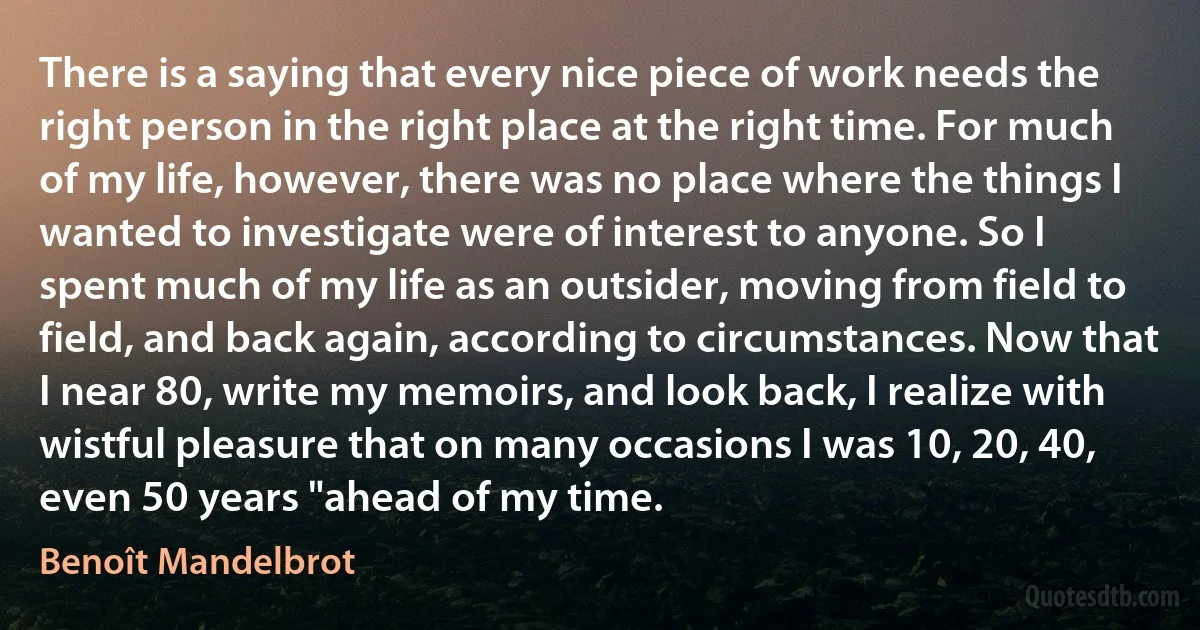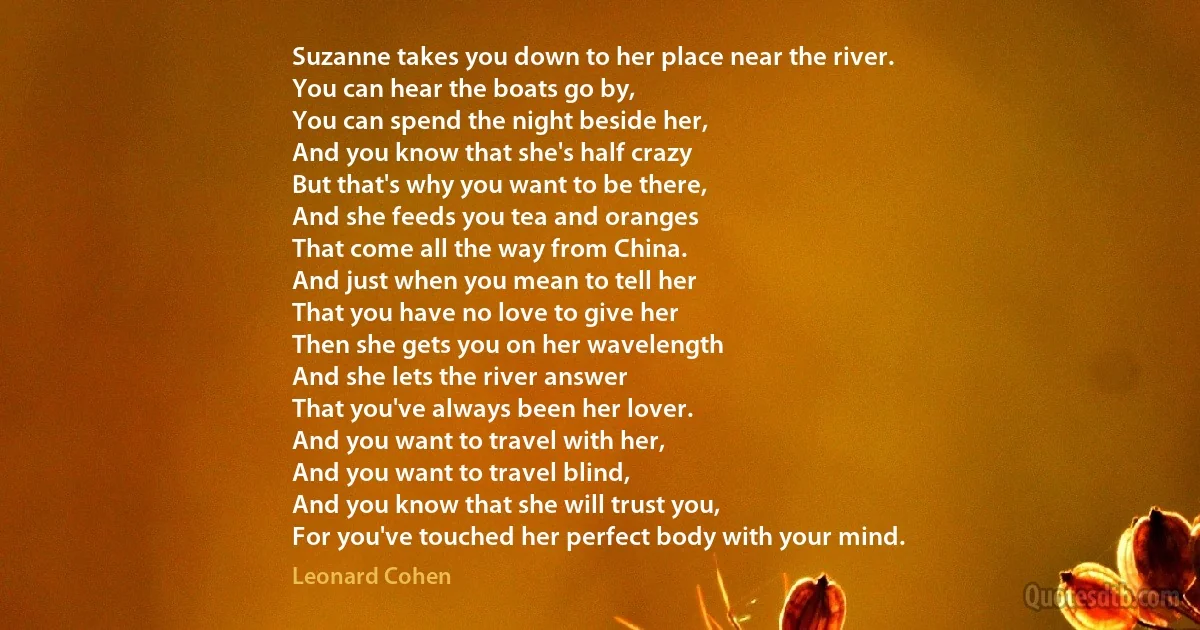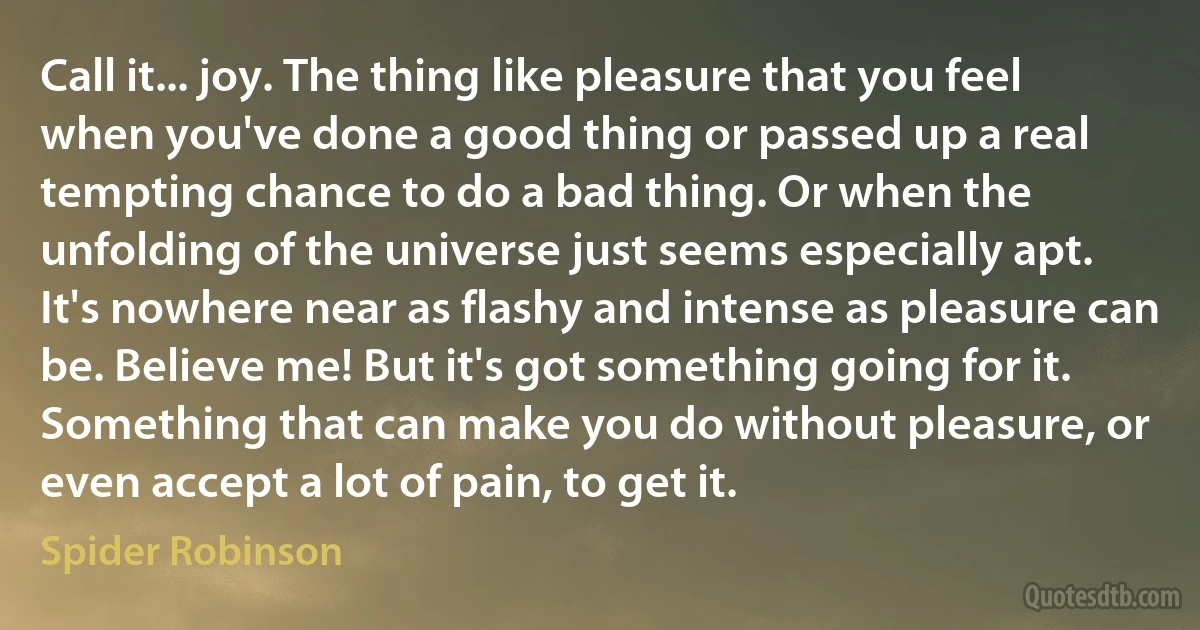Near Quotes - page 56
You will know that wretched men are the cause of their own suffering, who neither see nor hear the good that is near them, and few are the ones who know how to secure release from their troubles. Such is the fate that harms their minds; like pebbles they are tossed about from one thing to another with cares unceasing. For the dread companion Strife harms them unawares, whom one must not walk behind, but withdraw from and flee.

Pythagoras
What makes the difference is the mass. ...[T]he earth is a big mass and it slows down time. If you go to a bigger mass, like Jupiter, it's stronger. If you go near a big star it's stronger. If you're near a black hole... it's even more strong, so strong that if you go very near... time essentially stops down. It goes very, very, very slowly.

Carlo Rovelli
1910–11 was a time of the wildest uncertainty and political ferment. True, those good old politicians who still figure in the cartoons were already with us, but in what different guise! Our die-hard Mr Winston Churchill was the radical Home Secretary; Mr Ramsay MacDonald was preaching class war with something very near to verbal coherence; Mr Lloyd George, whom frequent photographs have endeared to us as a benevolent landed proprietor, was inveighing against the privileges of the gentry in terms which might have been translated direct from Danton or Robespierre.

Evelyn Waugh
Frederick the Great (1712-1786) once asked his personal physician, Dr. Zimmermann, "Can you name me a single proof of the existence of God?" Zimmermann replied, "Your Majesty, the Jews!" By that he meant that if one wanted to ask for a proof of God, for something visible and tangible, that no one could contest, which is unfolded before the eyes of all men, then we should have to turn to the Jews. Quite simply, there they are to the present day. Hundreds of little nations in the Near East... have dissolved and disappeared in the huge sea of nations; [only] this one tiny nation has maintained itself.... If the question of a proof of God is raised, one need merely point to this simple historical fact. For in the person of the Jew there stands before our eyes the witness of God's covenant with Abraham, Isaac, and Jacob, and in that way with us all. Even one who does not understand Holy Scripture can see this reminder.

Karl Barth
On a view of all circumstances I have judged it most prudent not to force Billey back to Virginia even if it could be done; and have accordingly taken measures for his final separation from me. I am persuaded his mind is too thoroughly tainted to be a fit companion for fellow slaves in Virginia. The laws here do not admit of his being sold for more than 7 years. I do not expect to get near the worth of him; but cannot think of punishing him by transportation merely for coveting that liberty for which we have paid the prices of so much blood, and have proclaimed so often to be the right, and worthy the pursuit of every human being.

James Madison
Love of God is something universal: the term "love" designates not only a path depending on will and feeling, but also − and this is its broadest meaning − every path insofar as it attaches us to the Divine; "love" is everything which makes us prefer God to the world and contemplation to earthly activity, wherever this alternative has a meaning. The best love will be, not that which most resembles what the word "love" can evoke in us a priori, but that which will attach us most steadfastly or most profoundly to Reality; to love God is to keep oneself near to Him, in the midst of the world just as beyond the world; God wants our souls, whatever may be our attitudes or our methods.

Frithjof Schuon
To adore, to understand, to receive, to feel, to give, to act: there is my law my duty, my happiness, my heaven. Let come what come will - even death. Only be at peace with self, live in the presence of God, in communion with Him, and leave the guidance of existence to those universal powers against whom thou canst do nothing! If death gives me time, so much the better. If its summons is near, so much the better still; if a half-death overtake me, still so much the better, for so the path of success is closed to me only that I may find opening before me the path of heroism, of moral greatness and resignation. Every life has its potentiality of greatness, and as it is impossible to be outside God, the best is consciously to dwell in Him.

Henri-Frédéric Amiel
The United States, as the near unanimous vote to provide nearly $40 billion in aid to Ukraine illustrates, is trapped in the death spiral of unchecked militarism. No high speed trains. No universal health care. No viable Covid relief program. No respite from 8.3 percent inflation. No infrastructure programs to repair decaying roads and bridges, which require $41.8 billion to fix the 43,586 structurally deficient bridges, on average 68 years old. No forgiveness of $1.7 trillion in student debt. No addressing income inequality. No program to feed the 17 million children who go to bed each night hungry. No rational gun control or curbing of the epidemic of nihilistic violence and mass shootings. No help for the 100,000 Americans who die each year of drug overdoses. No minimum wage of $15 an hour to counter 44 years of wage stagnation. No respite from gas prices that are projected to hit $6 a gallon.

Chris Hedges
This rivality was really building from the people of the newspapers and the fans. But I think it was very good for both of us, because the publicity was so big and it created a very big interest about me and Maria and was very good in the end. But I don't know why they put this kind of rivality, because the voice was very different. She was really something unusual. And I remember that I was very young artist too, and I stayed near the radio every time that I know that there was something on radio by Maria. The most fantastic thing was the possibility for her to sing the soprano coloratura with this big voice! This was something really special. Fantastic absolutely!

Maria Callas
In order to hear Love's words, you must allow Love to approach. However, when it does draw near, we fear what it might say to us, because Love is free and is not ruled by our will or by what we do...True Love, however, is the love that seduces and will never allow itself to be seduced... Love transforms, love heals. But sometimes it lays deadly traps and ends up destroying the person who decided to surrender himself completely. How can the force that moves the world and keeps the stars in their places be, at once, so creative and so devastating?

Paulo Coelho
"Wealth has to be created before it can be shared.” Starting from there, the emphasis is placed firmly on creating the political and economic climate where the men with the ideas and the men with the capital are given a chance to do so. Circumstances may have made the ownership of some industries by the State inevitable, but the unanimous verdict is that bureaucracy cramps, cripples and confines. That is no good for Britain. One sentence is devastating. "Socialised industries tend to produce inferior products at high prices by dissatisfied workers.” That is too near the truth for our comfort.

Alec Douglas-Home
So what's the moral? We've seen how the insistence on models that meet the standards of rigor in mainstream economics can lead to neglect of clearly valuable ideas. Does this mean that the whole emphasis on models is wrong? Should we make a major effort to open up economics, to relax our standards about what constitutes an acceptable argument? No-the moral of my tale is nowhere near that easy. Economists can often be remarkably obtuse, failing to see things that are right in front of them. But sometimes a bit of obtuseness is not entirely a bad thing.

Paul Krugman
The Hindoos are most serenely and thoughtfully religious than the Hebrews. They have perhaps a purer, more independent and impersonal knowledge of God. Their religious books describe the first inquisitive and contemplative access to God; the Hebrew bible a conscientious return, a grosser and more personal repentance. Repentance is not a free and fair highway to God. A wise man will dispense with repentance. It is shocking and passionate. God prefers that you approach him thoughtful, not penitent, though you are chief of sinners. It is only by forgetting yourself that you draw near to him. The calmness and gentleness with which the Hindoo philosophers approach and discourse on forbidden themes is admirable.

Henry David Thoreau
I trust that some may be as near and dear to Buddha, or Christ, or Swedenborg, who are without the pale of their churches. It is necessary not to be Christian to appreciate the beauty and significance of the life of Christ. I know that some will have hard thoughts of me, when they hear their Christ named beside my Buddha, yet I am sure that I am willing they should love their Christ more than my Buddha, for the love is the main thing, and I like him too.

Henry David Thoreau
Not without a slight shudder at the danger, I often perceive how near I had come to admitting into my mind the details of some trivial affair, - the news of the street; and I am astonished to observe how willing men are to lumber their minds with such rubbish, - to permit idle rumors and incidents of the most insignificant kind to intrude on ground which should be sacred to thought. Shall the mind be a public arena, where the affairs of the street and the gossip of the tea-table chiefly are discussed? Or shall it be a quarter of heaven itself, - an hypæthral temple, consecrated to the service of the gods? I find it so difficult to dispose of the few facts which to me are significant, that I hesitate to burden my attention with those which are insignificant, which only a divine mind could illustrate. Such is, for the most part, the news in newspapers and conversation. It is important to preserve the mind's chastity in this respect.

Henry David Thoreau
But ere the laughter died from out the rear,
Anger in front saw profanation near;
Jubal was but a name in each man's faith
For glorious power untouched by that slow death
Which creeps with creeping time; this too, the spot,
And this the day, it must be crime to blot,
Even with scoffing at a madman's lie:
Jubal was not a name to wed with mockery.
Two rushed upon him: two, the most devout
In honor of great Jubal, thrust him out,
And beat him with their flutes. 'Twas little need;
He strove not, cried not, but with tottering speed,
As if the scorn and howls were driving wind
That urged his body, serving so the mind
Which could but shrink and yearn, he sought the screen
Of thorny thickets, and there fell unseen.
The immortal name of Jubal filled the sky,
While Jubal lonely laid him down to die.

George Eliot
The success of England and her allies in the War of the Spanish Succession, which curbed "the exorbitant power of France" for eighty years to come, influenced the whole tone of Eighteenth Century civilization in a thousand ways. The defeat of Louis is one of the most prominent facts in history. We are, therefore, apt to forget how very near he came to attaining world-power, by the retention of the whole Spanish Empire as a field of French influence, and by the virtual annexation of the Netherlands and of Italy as jewels in the French Crown. He was never nearer to success than in the spring of 1704. Nothing but the accident of Marlborough's genius, and some lucky turns of fortune in the field that year, diverted the paths of destiny.

G. M. Trevelyan
Turner visited Plymouth (my native town) while I was staying there in the summer of 1813, or perhaps 1814 (1812 ?), painting portraits. As he wished to see the scenery of the river Tamar - [river in South-west England], I accompanied him, together with Mr. Ambrose Johns from Plymouth.. ..to a cottage near Calstock, the residence of my aunt, Miss Pearce, where we all stayed for a few days. From that point as a centre Turner made various excursions, and the result of one of his rambles was a sketch of the scene which afterwards grew into the celebrated picture of the painting 'Crossing the Brook'. The bridge in that picture is Calstock Bridge; some mining works are indicated in the middle distance. The extreme distance extends to the mouth of the Tamar, the harbour of Hamoaze, the hills of Mount Edgcumbe, and those on the opposite side of Plymouth Sound. The whole scene is extremely faithful.

J. M. W. Turner
About this time [c. 1812] Turner removed to Twickenham, where he purchased Sandycomb Lodge, near Richmond Bridge [London]. It was an unpretending little place, and the rooms were small. There were several models of ships in glass cases, to which Turner had painted a sea and background. They much resembled the large vessels in his sea pieces. Richmond scenery greatly influenced his style. The Scotch firs (or stone-pine) around are in most of his large classical subjects, and Richmond landscape is decidedly the basis of 'The Rise of Carthage'. Here he had a long strip of land, planted by him so thickly with willows that his father, who delighted in the garden, complained that it was a mere osier-bed. Turner used to refresh his eye with the run of the boughs from his sitting-room window.

J. M. W. Turner
The most important mine of Jesus-Maria at this time was one called Santa Juliana, which had been the means of alternately making and sinking several splendid fortunes. This mine had then reached a depth of between eight and nine hundred feet, and the operations were still tending downwards. The materials were drawn up by mule power applied to a windlass: but as the rope attached to it only extended half way down, another windlass had been erected at the distance of about four hundred feet from the mouth of the cavern, which was also worked by mules, and drew the ores, etc., from the bottom. On one occasion, as I was standing near the aperture of this great pit, watching the ascent of the windlass-rope, expecting every moment the appearance of the large leathern bucket which they employ for drawing up the minerals as well as the rubbish and water from the bottom, what should greet my vision but a mule...

Josiah Gregg
By an observation of an eclipse of one of Jupiter's satellites, on the night of the 25th of March, in latitude 350° 51' 30", I found that we were very near the 100th degree of longitude west from Greenwich. On the following day, therefore, we celebrated our entrance into the United States territory. Those who have never been beyond the purlieus of the land of their nativity, can form but a poor conception of the joy which the wanderer in distant climes experiences on treading once more upon his own native soil! Although we were yet far from the abodes of civilization, and further still from home, nevertheless the heart within us thrilled with exhilarating sensations; for we were again in our own territory, breathed our own free atmosphere, and were fairly out of reach of the arbitrary power which we had left behind us.

Josiah Gregg



